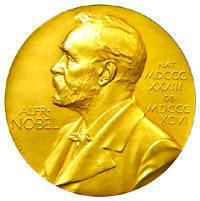|
 |
|
Nobel Prize
|
Scientists who have won a Nobel prize live nearly two years longer than those who were merely nominated, suggesting that social status confers "health-giving magic," British researchers said.
The researchers said there was evidence to link health and status in monkeys but it had been difficult until now to do the same for humans because status often brought more wealth, which improves living standards and medical care.
"Status seems to work a kind of health-giving magic," said Andrew Oswald, an economist1 at Warwick University who conducted the study with Matthew Rablen, a former Warwick postgraduate2 researcher who is now a government economist.
"Once we do the statistical3 corrections, walking across that platform in Stockholm apparently4 adds about two years to a scientist's life-span. How status does this, we just don't know," he said in a university press release.
The study entitled "Mortality and Immortality," published this month, focused on Nobel prize winners "as an ideal group to study as the winners could be seen as having their status suddenly dropped on them," it said.
The researchers studied 524 men -- 135 winners and 389 nominees6, who were in the competition for the physics and chemistry prizes between 1901 and 1950.
They looked at one sex only to avoid differences in life span between sexes. The total had been 528, but they dropped four who died in war or from other causes that were not natural.
The average life span for the nominee5 group was just over 76 years.
Prize winners lived 1.4 years longer on average -- or 77.2 years -- than those who were nominated for the award.
|
 收听单词发音
收听单词发音 
